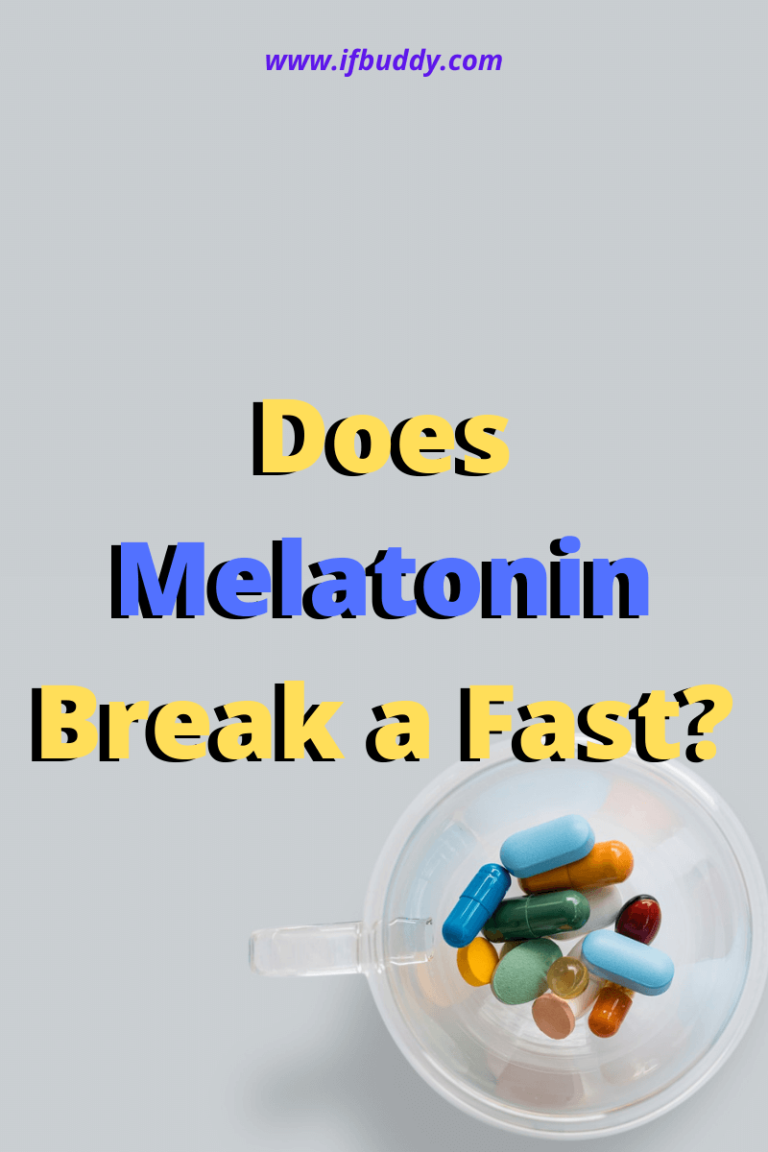Intermittent fasting can help you lose weight, manage blood sugar, and even sleep better. However, not everyone sees all these positive effects right away. In fact, some may find it a little harder to fall asleep as their circadian rhythm might be disrupted by the new eating schedule. Melatonin is a great solution for those issues. But does melatonin break a fast?
The answer depends on the form in which you take it. In pill form, melatonin has no carbs and no calories, so it won’t break a fast. In liquid or gummy form, it most likely will break it. There’s also the question of why you’re fasting and what method you’re following.
So let’s explore the topic of melatonin in-depth and see when it does break a fast, when is it ok, and how it can help intermittent fasting.
Does melatonin break a fast?
Breaking a fast usually means eating or drinking anything that has over 1-2 grams of carbs and 1-2 kcals. Some very strict fasting versions forbid the use of any supplements, even if they have no calories. That’s usually the case with water fasts or some strict religious fasts. Most intermittent fasting methods though allow supplements as long as you stay under the designated number of carbs.
With this in mind, melatonin pills do not break a fast. They provide no nutritional value, as they have no carbs and no calories.
Does melatonin break autophagy or gut rest?
If you’re fasting for autophagy or gut rest, there are sadly not enough studies to give you an answer. However, considering the lack of nutritional value, we can assume autophagy won’t be interrupted.
You should also be safe in the case of fasting for gut rest, but if you’re doing it for medical reasons, while under medical supervision, it is best to ask your doctor before taking melatonin.
Will melatonin gummies break a fast?
Melatonin gummies and liquid usually contain sugar and/or other sweeteners, Therefore, yes, there is a big risk they will break a fast. You can try to carefully read the label and see what’s in the gummies you want to take. The safest option when fasting though is to stick with melatonin pills.
This melatonin gummies product contains 15 calories and 4g of carbs per serving. In theory, it would break your fast. However, if you are dirty fasting and your goal is weight or fat loss, 15 calories will not harm you.
How does melatonin influence intermittent fasting?
Insomnia and intermittent fasting – why it happens
Sleep quality and intermittent fasting is a controversial topic. Why? Because you’ll probably find as many people who say fasting helped them sleep better as those who say it gave them insomnia. Studies are equally contradictory. You’ll find research that says fasting regulates the circadian rhythm and research that says the opposite. In other words, we’re all different, and we have different ways of reacting to fasting.
If you’re looking at an article about melatonin, chances are you’re in the group that experiences poor sleep due to fasting. This usually happens because your body perceives the abstinence from food as high stress, and it begins making more cortisol. Cortisol is a hormone that keeps you on high alert, ready to fight for your life. Except, in this case, no fight is coming, and you’re left with an excess of cortisol that leads to insomnia.
Melatonin helps your body wind down. It is a hormone that humans naturally produce in the evening after the sun sets and it gets dark. Sadly, with the technological advancements, we’re staring at computers all evening, spending time in artificial light, which means we produce less melatonin. Add to that an excess of cortisol caused by fasting and the results are disastrous.
Supplementing with melatonin can help you regain your natural sleep cycle. Without causing all the side effects of sleeping pills. But that’s not the only way in which melatonin helps intermittent fasting.
Melatonin benefits when fasting
1. Could help treat GERD
Gastroesophageal reflux disease, in short, GERD, is a condition that causes heartburn, nausea, and belching. It is caused by a backflow of stomach acid into the esophagus. Studies show melatonin can block the secretion of stomach acid and decreases the production of nitric oxide, which is responsible for relaxing the esophagus and allowing the stomach acid to enter.
GERD and fasting can be a very uncomfortable combination. While some people find that their symptoms get better when they fast, others report the opposite, so melatonin could be beneficial.
2. Could improve blood sugar management
Melatonin does not directly affect blood sugar or insulin levels. However, it is known that poor sleep comes with increased cravings, especially for sugar and salty foods. It also comes with impaired insulin response. By regulating your sleep cycle, melatonin can help prevent this issue, helping you fast with more ease.
3. Might increase levels of human growth hormone (HGH)
Human growth hormone (HGH) is responsible for healthy muscle mass and bone density and it is vital for cellular regeneration. A study on men who took either 0.5 mg or 5 mg of melatonin showed that all participants regardless of dosage had an increase in HGH levels.
This doesn’t directly impact intermittent fasting, but it is still a crucial benefit. When you fast for extended periods of time, there is always a risk that you will start losing muscle mass. Proper diet and strength training can counteract this, but a supplement that helps increase HGH naturally will also be very helpful.
Read also: Does Intermittent Fasting Make You Grow?
Does melatonin cause any side effects?
Melatonin is generally a safe supplement and rarely causes side effects. It is not addictive, and it does not impair the body’s ability to produce melatonin on its own.
Side effects, in the rare cases when they occur, include nausea, dizziness, and headaches. Melatonin could also interact with certain medications such as blood thinners, antidepressants, or blood pressure medication.
The bottom line
Does melatonin break a fast? Under most intermittent fasting methods, melatonin pills do not break a fast. They have no carbs or calories, therefore there’s no insulin reaction. Melatonin gummies and liquids usually contain flavors, sugar, and/or sweeteners, so there is a risk they will break a fast. You can either read the label carefully and make sure all the ingredients are safe or stick to melatonin pills.
Supplementing with melatonin during intermittent fasting can be very helpful. It will regulate your circadian rhythm, improving your sleep quality, and thus decreasing your cravings. It could also help you manage GERD and prevent muscle loss.


